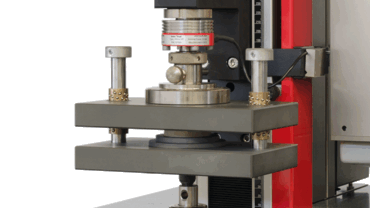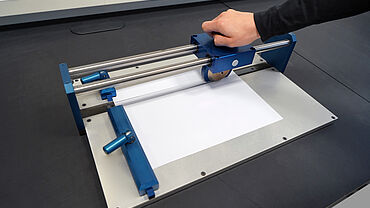Ring crush test (RCT ) ISO 12192 | TAPPI T822
Cardboard transport containers are often subjected to compression forces acting in a plane during transport or storage. The compressive strength depends on the construction of the container and the compressive strength of the components of the cardboard from which it is made. The in-plane compressive strength of these components can be determined by the ring crush test (also known as RCT).
.
ISO 12192 defines a method for determining the edge crush resistance (ring crush resistance) of paper and cardboard, particularly cardboard used in the manufacture of shipping containers. It applies to all paper and cardboard with a thickness between 100 µm and 580 µm. The RCT is also performed in accordance with the TAPPI T822 standard, which is primarily used in the North American paper industry.
Specimen preparation & test procedure RING CRUSH TEST DEVICE Materials testing machine Request a consultation Downloads
Ring crush test: Specimen preparation and test procedure
The ring crush test (RCT) determines the maximum compressive force that a standardized strip of paper or cardboard formed into a ring can withstand until it buckles. The compression force is applied axially to the ring.
Strips with a width of 12.7 mm are cut lengthwise and crosswise for the test. The thickness of the material must be determined in order to select the appropriate disc diameter for the specimen holder.
The strip is then inserted into the specimen grip so that it forms a complete ring. With a universal testing machine, the ring crush resistance is determined for the longitudinal and transverse directions separately using compression platens and a test speed of 12.5 mm/min. It is important that force application to the specimen is exactly perpendicular for this.
Furthermore, the measured values are highly dependent on proper specimen preparation. Specimen and guides must be exactly parallel to ensure accurate determination of ring crush strength. Optimum specimen parallelism is achieved with the ZwickRoell strip-cutter.
As the ring crush test provides information about specimen buckling behavior rather than crush behavior, it is increasingly being replaced by the short-span compression test (SCT).
ZwickRoell ring crush test device to ISO 12192 and TAPPI T822
To ensure standard-compliant performance of the ring crush test (RCT) to ISO 12192 and TAPPI T822 on paper and cardboard ZwickRoell has a compression test kit, which is can also be used for the edge crush test (ECT) to ISO 3037 and TAPPI T811, the flat crush test (FCT) to ISO 3035 and TAPPI T825 on corrugated board and the corrugated medium test (CMT) to ISO 7263 and TAPPI T809 on corrugated paper:
- The ring crush test device (RCT) consists of a base plate and nine discs of varying diameters.
- The base plate has a tangential insertion slot. The specimen is pushed into the free gap between the ring of the base plate and the inserted disc.
- Inserts for the ring crush test fit easily into the guided compression plates.
- Precision-guided compression platens provide extremely high lateral stiffness, ensuring reproducible determination of characteristic values.
Other crush tests that might interest you
| Short description | Standards |
|---|---|
| Paper | Corrugated paper | Corrugating medium test (CMT) |
|
| Paper & cardboard | Compressive strength / ring crush test (RCT) |
|
| Paper & cardboard | Compressive strength / short clamping test (SCT) |
|
| Paper | Corrugated paper | Short-span compressive strength (S-test) |
|
| Cardboard | Corrugated board | Flat crush test (FCT) |
|
| Cardboard | Corrugated board | Edge crush resistance (ECT) |
|
| Cardboard | Corrugated board | Box compression test / stacking test (BCT) |
|

